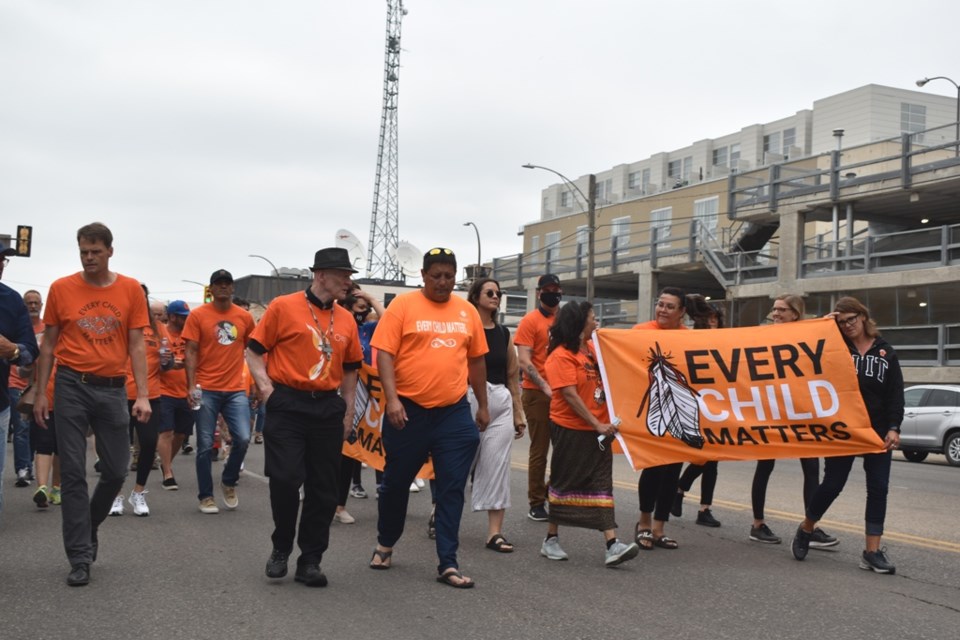Saskatoon Tribal Council Chief Mark Arcand knows the dark past caused by residential schools in Canada’s history, a heartbreaking past where thousands of Indigenous children were forcibly taken from their families so they could be assimilated to western norms. They were not allowed to speak their language and practice the traditional beliefs they learned from their Elders. They also experienced abuse and many died while attending the boarding schools.
Arcand believes, with the issue back under the spotlight after the discovery of gravesites in former residential schools, it is about time this sad event in the country’s history is taught in schools.
“As the Saskatoon Tribal Chief, I’m going to push the education system in the province that our kids and all kids should also be learning about residential schools.”
Arcand, speaking to members of the media before Tuesday’s Truth and Reconciliation Commission Calls to Action Awareness and Education Walk in Saskatoon, added they are going to prepare a curriculum for schools. “The curriculum may not be set yet, but we got to work to set that curriculum up. Because learning [only] about Columbus and Macbeth is not doing justice to our people.”
“We got to learn about this from education this day and age, and how we work from this so it never, ever happens to any child anywhere in the province, in this country or in this world; about what people went through. So, that’s the important piece. We’re going to work with the province to see what we can do and how we can improve the system of education.”
Arcand said events like the Tuesday’s walk, where an estimated 200 participated — including Saskatchewan MLA member Betty Nippi-Albright, Diocese of Saskatoon Bishop Mark Hagemoen, Saskatoon Mayor Charlie Clark — that created a sea of orange in downtown, helps in creating awareness, education and understanding.
“People are searching [unmarked graves], so it’s the truth. People even see a lot of young kids being out here and being part of this.”
He also apologized to the motorists in downtown Saskatoon that were forced to either stop for a few minutes or asked by police officers directing traffic to find other routes to get to their destination.
“It’s not about creating inconvenience. I know we’re going to stop traffic and that’s not our intention. We want people to understand what the residential schools did and how we feel. I hope they understand.”
Arcand said the fundraising efforts being done by the Catholic church, the United Church of Canada actively participating in preserving the gravesites, and Prime Minister Justin Trudeau appointing Mary Simon, an Indigenous woman, as Canada’s new Governor General as part of the healing process.
“There’s been calls for the churches to do the right thing and I think they are doing the right thing.”
“If our churches and our bishops are doing the right things, that’s what matters to us and hopefully other people in Canada will follow. When we talk about [PM] Trudeau and his appointment of the new governor general, we support it. It’s an Indigenous woman and she brings a lot of value and credibility. She’s the first one to make history. Now she’ll be coming to First Nations lands as the governor general that represents The Crown, the queen, that we have a treaty obligation as Indigenous People.”
Bishop Hagemoen, meanwhile, lauded the Greater Saskatoon Catholic Schools educational system in establishing a partnership between Indigenous and non-Indigenous people. “The Saskatoon Catholic system is a great example and it’s kind of under the radar and doing great things. We have great Indigenous teachers in our school system, elementary and high school, and they’re doing wonderful things not only in teaching but looking at Indigenous ways of learning and honouring Indigenous spiritualities and so forth.”
He added that Elders emphasize that healing and reconciliation does not happen on a grand level.
“It happens quietly with people. One of the things, I say this with great sincerity, when I went to the North, the Indigenous people of the North — the Metis and Dene — they really taught me in being a pastor. They didn’t want solutions, they wanted presence.
“They wanted a priest or a bishop to hear their story without judgement. It was a tough story to be present and to hear it all. That has taught me a lot and I’m still learning what does that mean in terms of pastoral work of the church with Indigenous people. Another big thing that comes out of the TRC Calls to Action is the honouring of Indigenous spiritual practices with Catholic kind of ways of worship and devotion.
“There’s a lot of similarities. There’s a reason why Christians, Catholics and Indigenous Peoples kind of have parallel spiritualities and have found a common place, in some way, to worship and fulfill spiritual ways. We’re doing a lot of work on learning.”




